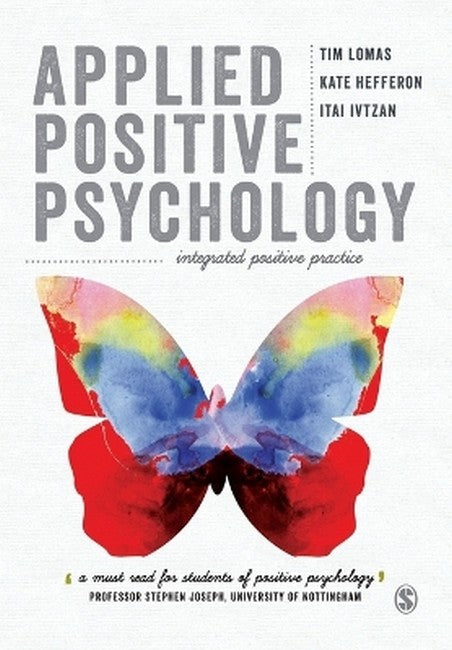Dr Tim Lomas, PhD, is a Psychology Research Scientist in the Department of Epidemiology at the Harvard T.H. Chan School of Public Health, and part of the Human Flourishing Program at Harvard University. Tim's main research focus is exploring cross-cultural perspectives on wellbeing, especially concepts and practices deemed 'non-Western.' Since 2013, Tim has published over 100 papers and 12 books relating to wellbeing, involving topics/approaches including linguistics, non-human intelligence, semiotics, art, emotional dialectics, balance/harmony, systems theory, social theory, politics, gender, and Buddhism. His latest book, entitled Happiness, was published in 2023 by MIT Press as part of their Essential Knowledge series. Dr. Kate Hefferon is a Chartered Research Psychologist, Senior Lecturer and Programme Leader of the Msc in Applied Positive Psychology at the University of East London. She is the author of several peer-reviewed papers, books and book chapters and has presented at conferences nationally and internationally on positive psychology. Her research interests include posttraumatic growth, resilience, physical activity and embodiment. Dr Itai Ivtzan is passionate about the combination of psychology and spirituality. He is the director of the School of Positive Transformation. He published several books, as well as many journal papers and book chapters. His main interests are positive psychology, mindfulness, and spirituality. He is a regular keynote speaker at conferences. If you wish to get additional information about his work or contact him, please visit the School of Positive Transformation website.
Request Academic Copy
Please copy the ISBN for submitting review copy form
Description
Introduction Chapter 1: Preparing for the Journey A map to guide us Our motto Chapter 2: The Mind Consciousness Embodiment Emotions Cognitions Awareness+ Chapter 3: The Body and the Brain Biochemistry Neurons Neural networks The nervous system The body Chapter 4: Culture and Society Microsystem Mesosystem Exosystem Macrosystem Ecosystem Chapter 5: Childhood and Development Pregnancy and birth Infancy Early childhood Positive education Positive youth development Development throughout adulthood Positive aging Chapter 6: Occupations and Organisations The mind The body Culture Society Chapter 7: Religion and Spirituality The religion-health connection Meditation and Buddhism Yoga and Hinduism Religion, spirituality, and positive psychology Chapter 8: Ethical and Reflective Practice Ethical practice Reflective practice
If you think you know what positive psychology is, think again! This book offers a new integrative vision for making life better that takes in the body and the brain, culture and society, and childhood and development. Written by the team who lead the Applied Positive Psychology programme at the University of East London you can be sure that the scholarship is cutting edge. A must read for students of positive psychology. -- Professor Stephen Joseph, editor of Positive Psychology in Practice It's hard to think of any discipline that could be more important in modern society than Positive Psychology - the science and practice of improving wellbeing. This book marks a significant coming-of-age for this exciting and rapidly developing field. It provides a grounded, compelling and comprehensive view of the many ways that Positive Psychology can help make life better - from individuals and families to schools, workplaces and communities; from birth and childhood to adult life and old age. If you want to understand what Positive Psychology really is, learn how it works in practice and discover its huge potential to transform our lives and our world then look no further than this superb book. I really can't recommend it highly enough. -- Dr Mark Williamson This textbook captures the best of the positive psychology initiative, and most importantly, translates it to practice. The authors bring remarkable depth and breadth to the subject matter and do so in a way that is fresh, engaging, relevant, and unusually thoughtful. Everyone who reads this book will derive useful insights about how to live. The closing chapter on ethical and reflective practice is a masterpiece. -- Carol Ryff If you are interested in having a positive impact on people's lives then this book is for you. By firmly placing Positive Psychology in an applied and social context the authors identify its true purpose - to make life better. It does a brilliant job of showing readers how to apply the insights that research has uncovered. It will surely become one of the go-to text books for all students of Positive Psychology. -- Nic Marks A major strength of the book relates to the diversity with which the material is presented. It is rare for a textbook to contain such a multitude of learning tools (e.g. case studies, measurement tools, media, and quizzes). In sum, Applied Positive Psychology provides a thoughtful and thorough description of the practical realm of positive psychology. It is an appropriate textbook choice for courses with an applied focus, and a good companion text for courses with a broader focus on positive psychology. -- Kelly Campbell, California State University, San Bernardino

